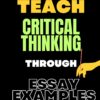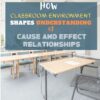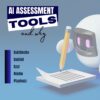Author: Jacqui
4 Highly Important Study Skills to Develop During College and Beyond
I am a lifelong learner. I find great joy in discovering something new and connecting it to what I know. This is made easier because I received a good foundation in my school years in how to learn. The Ask a Tech Teacher crew has ideas on those skills that will not only serve you well in your academics but beyond:
4 Highly Important Study Skills to Develop During College and Beyond
We spend a lifetime learning, so it makes sense to develop a few study skills that will make our lives easier. Plus, some of these skills will help you have a successful career and even stay ahead.
Today, we’ll talk about 4 of these highly important skills and how to achieve them while you’re still in college.
Share this:
Teacher’s Practice of Teaching Critical Thinking Through Essay Examples
Teaching Critical Thinking Through Essay Examples: Unlocking Minds
We’re exploring a fun classroom adventure where teachers teach us to think carefully and write good essays using examples. Get ready to go on an interesting trip through the world of education. We’ll see how these great teachers turn simple essays into smart thinking tools. Let’s get our learning hats on and explore the exciting landscape of teaching critical thinking through essay examples!
Why Essays? Unraveling the Mystery
Before we leap into the nitty-gritty, you might wonder, “Why essays?” Hold on to your hats because these innocent writing pieces are secret treasure chests filled with the spark of critical thinking. Essays are like intellectual playgrounds where students swing between ideas, bounce off different perspectives, and dive deep into topics. They’re the building blocks of academic exploration, and guess what? They’re not about getting good grades they’re about nurturing your brain into an analytical powerhouse.
Transforming Analysis into Action: Elevating Learning
But hold your horses. The beauty lies in applying analytical prowess beyond the classroom walls. Critical thinking isn’t a skill. It’s a way of life. When you dissect essay samples for college, you’re becoming a better student, a sharper problem solver, a more empathetic communicator, and a curious explorer of ideas. Here’s the deal: Imagine a treasure map leading you to a pot of gold. In our educational journey, that treasure map is a free essay example and the pot of gold? That’s the wisdom and insight waiting to be uncovered on a useful web site like gradesfixer.com. These valuable websites are like the friendly wizards of the internet, giving you access to many essays spanning various topics and styles. It’s like having a library at your fingertips, ready to whisk you to new realms of thought and analysis.
1. Curricular Crossroads: Where Critical Thinking Meets the Curriculum
Picture this: you’re navigating through the intricate maze of your curriculum, and you stumble upon a hidden passage. This passage isn’t a shortcut, it’s a gateway to unlocking the full potential of your education. Welcome to the realm where critical thinking and curriculum shake hands in a glorious embrace.
Teachers, those educational wizards, know how to blend the essence of critical thinking into every subject. Whether it’s dissecting historical events, analyzing scientific experiments, or deconstructing literary masterpieces, the art of critical thinking is woven into the fabric of your curriculum.
2. Exams: The Ultimate Critical Thinking Challenge
Ah, exams – the inevitable rite of passage for students everywhere. But hold on a minute, let’s flip the script. Exams aren’t about regurgitating facts, they’re arenas for showcasing your critical thinking prowess. Remember those analytical skills you’ve honed by dissecting essays? Well, they’re your secret weapons against the exams!
When armed with the ability to analyze critically, you approach exam questions like a puzzle waiting to be solved. No longer are you memorizing? You’re synthesizing information, connecting dots, and crafting thoughtful responses demonstrating a deep understanding of the subject. The result? You’re not earning grades, you’re conquering the exam battlefield with the banner of critical thinking held high.
3. From Web Pages to Real-World Savvy
Let’s talk about how your adventures in critical thinking extend beyond the classroom walls. The real world is a complex tapestry of ideas, challenges, and opportunities. And guess what? Your trusty companions on your journey are the skills you’ve sharpened while dissecting essays and curricular content.
The Art of Unpacking Essays: Teacher’s Edition
So, what’s the secret sauce teachers use to sprinkle critical thinking magic onto those essay pages? Let’s unveil the mystery:
Question Everything: Teachers aren’t after the correct answers, they want to know how you got there. They’ll throw you questions like a master archer aiming for the bullseye of your brain. “Why did the author use this word? How does this argument hold up under scrutiny?” These questions unravel the threads of an essay, revealing the intricate web of thought behind it.
Play the Devil’s Advocate: Ever seen a teacher transform into a debate wizard? That’s them encouraging you to wear the hat of a critical thinker. They’ll prod you to analyze different sides of an argument, push your boundaries, and consider viewpoints you might have dismissed at first glance.
Spot the Big Ideas: Essays are like puzzles, and teachers are the ultimate puzzle masters. They’ll guide you in dissecting an essay to identify the central themes, arguments, and underlying messages. It’s like being a detective in your mind!
In Conclusion: Your Critical Thinking Odyssey
So, my fellow adventurers in learning, remember this: essays aren’t words on paper. They’re the keys to unlocking your mind’s potential. By diving into the world of essay samples, you’re embarking on a journey that will shape your grades and outlook on the planet. Embrace the challenge, the questions, and the magic of critical thinking. And if you ever need a trusty sidekick in your quest, don’t forget to visit gradesfixer.com for inspiration and enlightenment! Now go forth, armed with the power of critical thinking, and conquer the academic universe, one essay at a time.
–Photo credit by Nick Morrison on Unsplash and Super Snapper on Unsplash
Here’s the sign-up link if the image above doesn’t work:
Jacqui Murray has been teaching K-18 technology for 30 years. She is the editor/author of over a hundred tech ed resources including a K-12 technology curriculum, K-8 keyboard curriculum, K-8 Digital Citizenship curriculum. She is an adjunct professor in tech ed, Master Teacher, webmaster for four blogs, an Amazon Vine Voice, CSTA presentation reviewer, freelance journalist on tech ed topics, contributor to NEA Today, and author of the tech thrillers, To Hunt a Sub and Twenty-four Days. You can find her resources at Structured Learning.
Share this:
How Classroom Environment Shapes Understanding of Cause and Effect Relationships
How do teaching methods influence understanding? What can you do to make things work better in the classroom with simple fixes? Find the answers here.
How The Classroom Environment Shapes Understanding of Cause and Effect Relationships
Mastering cause-and-effect relationships in research is crucial for a student’s academic future and career. Having this knowledge, it would be easier to deal with assignments, homework, and life issues. But what role does the classroom environment play in this understanding? Read on to find out.
Share this:
8 Great Websites and Apps to Help Kids With Fractions
Fractions are not the easiest of math concepts to learn (or teach), yet are arguably one of the most oft applied to our daily lives. Teachers have long sought intuitive methods to teach fractions that are less frustrating than worksheets and more effective than rote drills. Luckily, there are a lot of online apps on offer that are accessible to students and make learning much easier than traditional methods. The Ask a Tech Teacher crew has eight of their favorites to share today:
8 Great Websites and Apps to Help Kids With Fractions
Understanding fractions is an essential pillar of every child’s mathematical foundation. Yet, it can often be a teaching challenge due to its complex nature.
With the advent of modern technology, learning this critical skill doesn’t have to feel like a chore anymore. A wealth of educational websites and apps are now readily available that make learning fractions engaging and fun for children.
These digital tools use interactive games, dynamic visual aids, and graded tasks designed to simplify fractional concepts and enhance mastery. So let’s look at eight of the top options worth weighing up today.
Share this:
Private ESL Tutoring: Your Pathway to English Proficiency
Learning a second language is a challenge, whether it be English, Russian, or any of the hundreds of world languages we find across the globe. You may need to do this because you’ve moved to a new country, because your job changed, or it’s a personal interest. The question becomes: How to make that happen? Do you immerse yourself? Use an app? Take online courses? Or something else?
One of our Ask a Tech Teacher crew has another idea that may be the fastest, most efficient: Private ESL tutoring:
Private ESL Tutoring: Your Pathway to English Proficiency
Share this:
9 Mistakes Teachers Make Using Tech in the Classroom
It’s easy to confuse ‘using technology’ with digital tools. Your school passed iPads out to all classes. Some of your colleagues think having students read in this tablet format means they’re integrating technology into their curriculum. Kudos for a good start, but they need to use the tablets to differentiate for student learning styles, enrich learning materials, and turn students into life-long learners.
That’s harder than it sounds. Technology hasn’t been around long enough to beget standards that work for everyone (not withstanding ISTE’s herculean efforts), the set-in-stone of settled science. Truth, that will never happen. Technology tools populate like bacteria in a culture. Every time you turn around, there’s another favorite tool some teacher swears has turned her students into geniuses and her class into a model of efficiency. After fifteen years of teaching technology, chatting with colleagues, and experimenting, I can assure you there is no magic wand. What there is is a teacher not afraid to try new ways, test them out in a classroom environment, toss what doesn’t work and share the rest. Her/his success doesn’t come without lots of failure and mistakes, widgets that sounded good but were too complicated or non-intuitive for a 21st century classroom.
Which of these nine mistakes do you make? Then, see how to fix them:
Share this:
The Top 5 AI Quiz Builder Tools That Can Transform Your Classroom and Their Benefits
Artificial Intelligence–AI–can greatly assist many mundane education tasks. Tools like Siri, Alexa, ChatGPT, and a plethora of apps seem perfect for handling the repetitive and time-consuming aspects of education that take teachers away from the core of most lessons that require critical thinking, creativity, and problem-solving. Done right, this sort of collaboration between AI and teacher results in a better outcome for everyone.
One task identified by many teachers as well suited to AI assistance is generating quiz content, Our Ask A Tech Teacher crew came up with five great options for using AI in quiz creation and then reasons to pick one of them:
- QuizGecko
- Quizlet
- Qzzr
- Riddle
- Playbuzz
The Top 5 AI Quiz Builders For Your Classroom
Share this:
5 Tips to Bring Joy to Education
Aristotle famously said,
“The roots of education are bitter, but the fruit is sweet.”
As a teacher, I have a different opinion. The process of learning should be as joyous as the end result. Luckily, Lainey Franks agrees with me. She is a former educator with 15 years experience in the classroom. In 2022 she became the CEO of Tools for Schools, the developers of Book Creator – an inclusive, creative edtech tool. I think I would have liked being in her classroom. Here are her five tips for bringing pizazz back to education, using a great tool students in my classes love:
5 tips to bring joy back to school
By Lainey Franks
When I was teaching, the start of the summer was always a time for me to relax and spend quality time with my family. But it was also a time when I would start thinking about the upcoming school year.
Share this:
Unconventional Research Sites to Inspire Students
Pew Research recently reported that about half of Americans regularly get their news from social media. Really? Isn’t SM where you share personal information, stay in touch with friends and families, post pictures of weddings and birthdays, and gossip? So why do students turn to it for news?
This stat may explain it: 60% of people don’t trust traditional news sources. That’s newspapers, evening news, and anything considered ‘mainstream media’. They prefer blogs, Twitter, and Facebook.
So when it comes to research, are you still directing kids toward your grandmother’s resources — encyclopedias, reference books, and museums? No doubt, these are excellent sources, but if students aren’t motivated by them, they won’t get a lot out of them. I have a list of six research sites designed by their developers with an eye toward enticing students in and keeping their interest. It’s notable that most are free, but include advertising. The exception is BrainPOP — there are no ads, but it requires a hefty annual fee:
Share this:
5 Ways for Teachers to Streamline Their Workload
Streamlining teacher work means finding (more) efficient ways to manage tasks, improve productivity, and enhance the teaching experience. Here are strategies to achieve this from the Ask a Tech Teacher crew:
5 Ways for Teachers to Streamline Their Workload
It’s not easy being a teacher considering the amount of work you deal with every day. On the surface, you prepare lesson plans and determine the series of activities you will give for your next class. Underneath it all, there’s the overbearing workload that consists of endless paperwork and ad hoc responsibilities during on-campus events.






















































